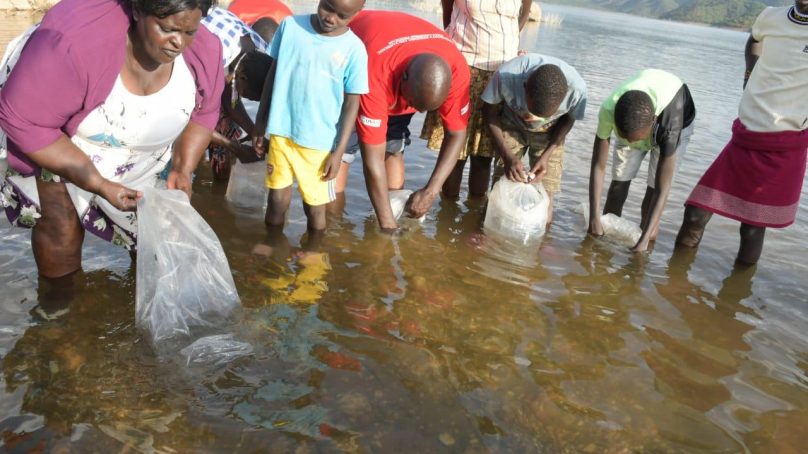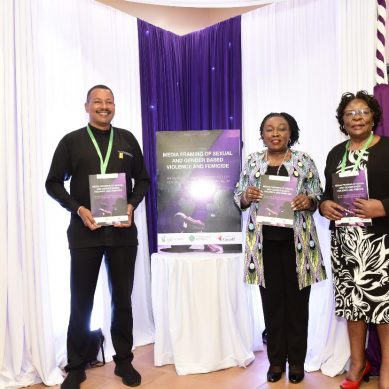
Turkwel Dam restocked with 80,000 fingerlings as Kenya makes blue economy a hymn of economic rebound
Kenya government has restocked Turkwel Dam with 80,000 tilapia fingerlings to replenish the dwindling fish stocks in the man-made lake to keep afloat a vital source of livelihood.
Addressing the press at Turkwel Dam, Ann Mokoro, the regional director of the project revealed that during a survey of the dam, researchers realised that fish population was dwindling and there was an urgent need for restocking.
‘‘The survey of the dam highlighted the fish had significantly decreased underscoring the need for restocking the dam,’’ Ms Mokoro said.
She said the decline of fish had adversely affected fisher-folk who are now struggling to harvest fish to for food and business. The director said that, as a resault of diminished fish numbers, the Kenya fisheries requested the national government to restock the dam to ensure the local residents have access to food.
Mokoro said the dam is importance to the community as it is a vital source of food and income through fish sales, besides supporting environmental conservation.
‘‘The income generated from fishing enables people to pay school fees for their children, which is important both economically and socially,’’ Mokoro pointed out.
She encouraged fishermen to harvest mature fish only and return young ones into the dam to promote stock growth.
‘‘Fishermen should also obtain licences and register with Beach Management Unit (BMU) for legal recognition and to receive government support,’’ Mokoro said.
She disclosed that there is a formal process for formation and registration of BMUs, which oversee dam management and ensure that only the fisher-folk benefit from government support, including donations and resources. Mokoro also mentioned that the Kenya Fisheries Services department is collaborating with the county government in West Pokot to engage the local community in forming a BMU.
She said the formation of BMUs helps the fisheries department identify people vested with dam management duty, ensuring they can benefit from government support. She said given the size of Turkwel Dam, the distribution for restocking consists of 40,000 fingerlings to the Kango’letiang area and 40,000 to the Riting area to replenish fish stocks and ensure sustainable harvests.
Mokoro emphasised the importance of community cooperation, proper regulations and government support to sustain the fishery, improve livelihoods and maintain ecological balance in the dam. She urged the local community to care for restocked fish and reminded those who have not yet obtained their fishing licenses to do so too.
Samoei Kosgei, the director of fisheries department in West Pokot County, expressed gratitude to the national government and the Kenya Fisheries Services for the donation of high-quality fingerlings from Sagana National Research and Breeding Centre.
He noted that it was the first time the county government had received fingerlings from Sagana, noting that previously they had been sourcing from Kisumu and Chwele in Bungoma County. Kosgei cautioned locals against using illegal fishing nets and emphasised the importance of caring for the fish population, which would ultimately benefit the community.
He encouraged proper fishing practices, urging fisher folk to return any small fish caught back to the dam. He also highlighted the necessity for fishermen to register with the beach management unit to for them to participate in fishing activities at the dam, stating that future support from the government, including fishing nets and boats, would only be available to those registered.
Anton Mulegeni, Chair of Kapsendu Beach Management Unit at Turkwel Dam, expressed gratitude to the government for restocking fish in the dam. He noted that they had experienced low and small-sized fish catches and expressed optimism that the increased fish stock will boost local incomes.
Mulegeni urged fishermen to obtain genuine licences to operate legally and avoid illegal fishing practices.
‘‘Currently, only about 15 individuals are licensed and efforts are ongoing to sensitise more community members about the importance of licensing,’’ he said.
He also highlighted the importance of community awareness on legal fishing practices, supported by advice from area administrative officers. Philomena Siwa, a local fisherwoman, expressed happiness over receiving fish from the national government and appreciated the training provided by Kenya Fisheries Services.
She requested the government to recruit security personnel to protect the dam from illegal fishing and suggested organizing educational tours for locals to learn more about dam and fish management. Additionally, she called for employment opportunities for local residents.
Bishop Peter Siwa, from the Riting area of Turkwel, thanked the government for the donation of 80,000 fingerlings, acknowledging the positive impact such support could have on the region. He noted that the dam has transformed the lives of many residents, many of whom had shifted from engaging in banditry and theft to pursuing fishing as a means of livelihood.
Siwa requested that the government consider donating a motorboat and providing locals with employment for dam management.
He told the government to secure the dam against illegal fishing with designated closure periods before fishing to allow for fish population to thrive. He explained the importance of having security guards and monitoring activities at the dam to ensure that no one accesses it.
- A Tell Media / KNA report / By Anthony Melly







